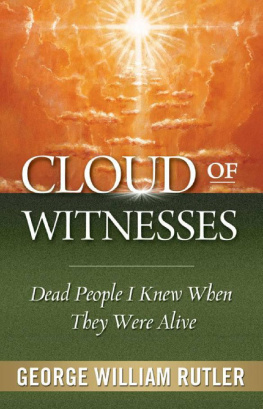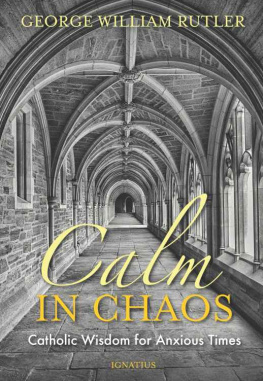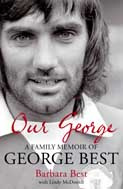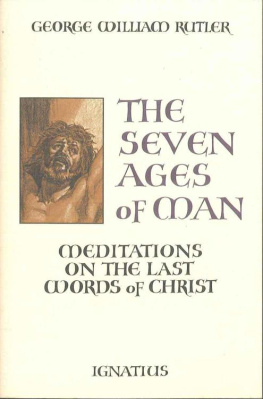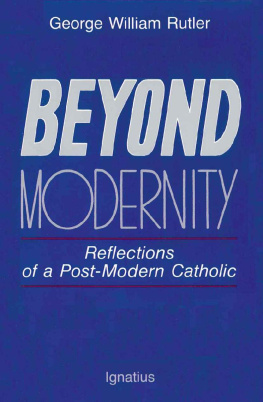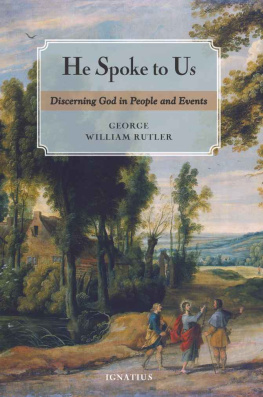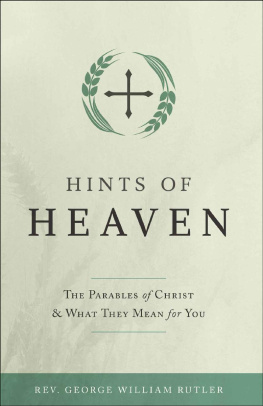
CLOUD OF WITNESSES
Copyright 2010, George William Rutler
The total or partial reproduction of this book is not permitted, nor its informatic treatment, or the transmission of any form or by any means, either electronic, mechanic, photocopy or other methods, without the prior written permission of the owners of the copyright.
The publisher acknowledges excerpt of the following material: p. xv, The Huw Morgan quotation, How Green Was My Valley , Robert Llewelyn, New York, Scribners, 1941; p. 5, Robert Frost, Desert Places, in A Further Range , New York, Henry Holt, 1936; p. 1920, W.H. Auden September 1, 1939 in Another Time , New York, Random House, 1940; p. 40, Lawrence Binyon, For the Fallen, in For the Fallen & Other Poems , London, Hodder & Stoughton, 1917.
Scripture quotations are the authors own translations from the Greek.
Copyright 2010, Scepter Publishers, Inc.
P.O. Box 211, New York, N.Y. 10018
www.scepterpublishers.org
Printed in the United States of America
ISBN-13: 978-1-59417-088-1
eBook ISBN: 978-1-59417-098-0
CLOUD OF WITNESSES
_______
Dead People I Knew When They Were Alive
GEORGE WILLIAM RUTLER

Therefore, since we are surrounded by so great a cloud of witnesses, let us also lay aside every weight, and sin which clings so closely, and let us run with perseverance the race that is set before us. (Hebrews 12:1)
***
CONTENTS
FOREWORD
The twentieth century was the American Century or more correctly that century dominated culturally, financially, and militarily by the United States. I suspect that this century too will belong to the U.S.A. but that China will be a more enduring rival than Japan or Germany or Russia. But that is another story and life is often surprising.
Pope John Paul II used to refer to New York as the capital of the world or perhaps the capital of the Western world. And so it is. We are not being untruthful or too disrespectful in pointing out that New York has the best and worst of everything.
Father Rutler is a Catholic priest in that great city and this collection of portraits constitutes an unusual book; typically so for the authors works are often unusual in their insights, their range of knowledge, and the elegance of the writing.
Catholics are now part of the North American mainstream, torn in different directions by the culture wars and with large segments seriously tempted towards liberal Protestantism, just as many of those liberal Protestants lapse into agnosticism or morph into Evangelicals.
Father George is conservative and a Catholic from the radical center, an avowed follower and admirer of Pope John Paul II and Pope Benedict. He also belongs to that small, influential, and growing group of convert intellectuals which has enriched the Catholic community and contributed mightily to scholarship and public discourse. He deserves to rank with Cardinal Avery Dulles, S.J., Father Richard Neuhaus, and Scott Hahn.
When historians of the future will be seeking to understand better the vitality, energy, and variety of this period of history, they will be helped mightily by dipping into pot-pourri.
While Father George might not know everyone worth knowing he does introduce us to a bewildering range of characters stretching from Mother Teresa to Queen Elizabeth, the wife of George VI whom Hitler described as the most dangerous woman in Europe; from Barbara Cartland to Robert Frost, from the parish secretary to Cardinal Lustiger, Jewish archbishop of Paris and a rabbinical clone of Wojtyla; from a university chaplain to Billy of Engine Company 21.
We find no malice in these portraits, but he is honest, perhaps a little tougher on his fellow clerics, as he writes loyally of the humanity of his friends.
I know a few of the characters brought to life in these sketches and can vouch for their accuracy. I therefore feel confident in recommending also the larger number of personalities I did not know, captured in these vignettes, these elegant impressions of departed friends.
Father George gives us glimpses into a fascinating world, much of it conservative and Christian, not all of it grand in a secular sense, but certainly bringing us evidence of the infinite variety of human grandeur. He is uniquely placed to reveal to us some of the persons who toiled to make the U.S.A. what it was at the zenith of its power.
GEORGE CARDINAL PELL
Archbishop of Sydney
December 16, 2009
CHARACTERS I HAVE KNOWN
These are the researches of Herodotus of Halicarnassus, which he publishes, in the hope of thereby preserving from decay the remembrance of what men have done and of preventing the great and wonderful actions of the Greeks and the Barbarians from losing their due meed of glory; and withal to put on record what were their grounds of feuds.
Herodotus wrote his record of human deeds five centuries before Christ, when the world already seemed weighted down with so many lives. He began his first book, Clio , declaring his purpose, and it has been translated many times, perhaps most floridly by Macaulay. The version above is by George Rawlinson, Camden Professor of Ancient History in the University of Oxford, whose life spanned nearly a century. When Rawlinson was born, George III and James Madison were alive, and when he died Edward VII and Theodore Roosevelt were in power. If he had not been bound by convention and the duties of his job, he might have written recollections of people he knew in those days as interesting as anything Herodotus has given us. Not just of the great names but of people who made up the rest of those days and most of whom are forgotten. No one is uninteresting, and everyone has been a character in the biography of the world.
Frail familiarity with Greek obscures a real understanding of the Greek karakter , which I would make the theme of the character sketches I have written. To say someone is a real character or has a lot of character or lacks character resounds with the classical sense of a karakter as something stamped by something outside the self. Wolves and whales have their appeal and proper dignity, but they are not great characters. The saints are the greatest characters because they are most impressionable to the divine will, and it is an indictment of our time that they are largely ignored, almost self-consciously so, by our schools. They were, as St. Catherine of Siena said, already in heaven on earth. Souls perfectly impressed by a transcendent power are perfectly unimpressed with themselves. This is the blessedness of the poor in spirit. A self so hard that it will not be impressed by timeless truths will be chiseled by mere creatures until it breaks.
I have written about characters I have known and who have impressed me because God in different ways impressed them. Perhaps most were not yet saints, and some decidedly were not so blessed and even seemed to struggle against the blessing. But each of them taught me something about the infinite variety of human grandeur. People who live lives larger than their own are living gospels written in black and white by deeds and misdeeds, and together they form a cloud of witnesses (Hebrews 12:1), stormy and serene. Some of these characters were well known, and some may be remembered only by a few. The justice without which there is no charity requires that I write only about those who have finished their earthly lives.
These are not biographies. Each gave something to me. Others could say much more about them, but by deliberately writing only vignettes, I want to make the point that some passing influence, some remark or circumstance, was personal enough to have made me something that I would not have been without them. I do not blame them if I did not learn from them all I might have or if I have failed to become what I could have become because of them. My mention of them is perhaps more like the Japanese poetry that gives an impression instead of a reproduction; but it is an impression made by that unique mystery, a human person, so important that thinkers such as Aquinas and Newman have said that it would be better for whole galaxies to collapse than one of these souls be lost. That is incomprehensible to the materialist who may not differentiate the human being from other creatures and who has difficulty conceiving of a deliberate creation at all, but it is based on an intuition common to humanitys finest hours.
Next page
